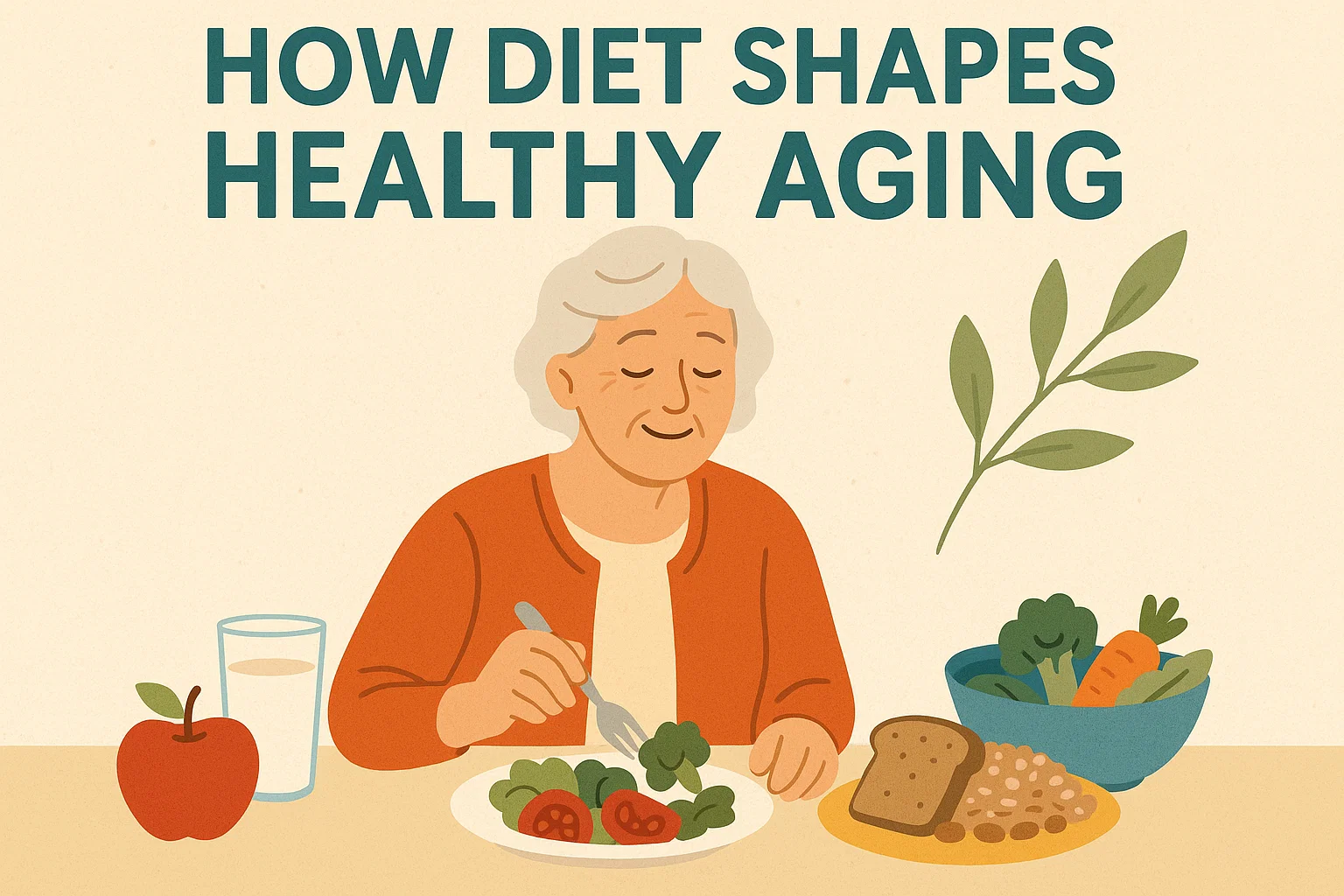Cells gauge nutrient availability through molecular sensors like mTOR, AMPK and sirtuins. When nutrients are abundant, especially amino acids and simple sugars, mTOR activity increases, driving growth and protein synthesis but suppressing cellular cleanup (autophagy). Over decades, chronic mTOR activation accelerates wear on proteins and organelles. In contrast, activating AMPK, which responds to low energy states, and sirtuins, which depend on NAD⁺, shifts cells into maintenance mode: enhancing autophagy, DNA repair, and mitochondrial biogenesis. Dietary strategies that periodically limit calories or specific macronutrients can thus recalibrate these pathways toward cellular renewal, laying a foundation for healthier years ahead.

Macronutrient balance: Protein, carbs and fats
Protein quality and quantity: Adequate protein preserves muscle mass and immune competence, but excessive intake, particularly of branched-chain amino acids, may overactivate mTOR. Aim for moderate protein (0.8–1.2 g/kg body weight), focusing on plant sources (legumes, nuts, soy) and fatty fish, which supply both essential amino acids and omega-3s that quell inflammation.
Complex carbohydrates: Whole grains, fruits and vegetables provide slow-release energy, fiber and micronutrients without spiking insulin. High glycemic-index foods trigger rapid blood sugar swings that stress beta cells and promote glycation end products, both linked to aging phenotypes.
Healthy lipids: Monounsaturated and polyunsaturated fats, olive oil, avocados, flaxseeds, support cell membrane integrity, hormone synthesis and anti-inflammatory eicosanoid production. Limiting trans fats and excessive omega-6s helps maintain a favorable balance that protects cardiovascular and brain health.
Phytochemicals and antioxidant support
Plants teem with polyphenols, like resveratrol, quercetin and epigallocatechin gallate, that activate sirtuins and Nrf2, bolstering antioxidant defenses and detoxification pathways. These compounds also modulate gut microbiota, favoring short-chain fatty acid production that nourishes colonocytes and tempers systemic inflammation. Incorporating a rainbow of fruits, vegetables, herbs and spices ensures a broad spectrum of bioactives that reinforce cellular resilience.
Gut microbiome: The diet–aging connection
Emerging research links microbial diversity and metabolite profiles to aging trajectories. Diets rich in fermentable fiber foster beneficial species that produce butyrate and propionate, metabolites shown to enhance gut barrier function, regulate immune tone and even influence epigenetic markers of longevity. Conversely, high-fat, low-fiber diets can lead to dysbiosis, endotoxemia and chronic inflammation. Strategies such as prebiotic-rich foods (onions, garlic, leeks), fermented fare (yogurt, kefir, kimchi) and a variety of plant fibers support a microbiome that ages with grace.
Dietary patterns proven in humans
Large cohort studies and randomized trials highlight several patterns associated with longer, healthier lives:
Mediterranean diet: Emphasizes olive oil, vegetables, legumes, nuts, fish and moderate wine. Linked to lower cardiovascular events, preserved cognition and reduced frailty.
Blue Zones diets: Characterized by plant-forward meals, minimal processed foods and moderate caloric intake. Okinawans stop eating when 80 percent full, a practice shown to minimize metabolic stress.
Time-restricted eating: Limiting daily eating windows to 8–10 hours may improve insulin sensitivity, blood lipids and markers of inflammation, echoing benefits seen in intermittent fasting models.
Micronutrients and Aaging
Vitamins and minerals play critical roles in antioxidant defense, DNA repair and mitochondrial function. Deficiencies in vitamin D, B12, magnesium and zinc correlate with frailty, cognitive decline and immune dysregulation. Regular assessments—through dietary analysis and blood work, can guide targeted supplementation to correct gaps and support processes that underpin long-term health.
Supplements and targeted interventions
While whole foods should form the foundation, select supplements can complement a longevity-focused diet. Compounds that activate AMPK (e.g., berberine), boost NAD⁺ (nicotinamide riboside) or inhibit mTOR (rapamycin analogues in research settings) have shown promise. A balanced approach, grounded in emerging human trials and mindful of interactions, can help tune biochemical circuits without veering into over-supplementation.
Practical guidelines for daily eating
Start with plants: Fill half your plate with colorful vegetables and fruits.
Choose whole grains: Replace refined grains with quinoa, brown rice or oats.
Include healthy fats: Drizzle extra virgin olive oil, snack on nuts and seeds.
Moderate protein: Focus on fish, legumes and fermented soy, limiting red meat to small portions.
Hydrate wisely: Water, herbal teas and diluted kombucha support digestion and detoxification.
Mindful timing: Aim for 12–14 hours of overnight fasting to engage repair pathways.
Empathy and Cryopreservation options
When a life-limiting diagnosis arrives, dietary efforts may not suffice to halt progression. We understand the emotional and existential challenges that come with such news. Cryopreservation is not a cure, but an opportunity to preserve your body, and the delicate architecture of your brain, at legal death, awaiting future advances that may restore function. If you’d like to learn more about how this process works and explore whether it aligns with your hopes and values, we’re here to guide you with compassion and clarity.
About Tomorrow.bio
At Tomorrow.bio we are dedicated to advancing the science of cryopreservation with the goal of giving people a second chance at life As Europe’s leading human cryopreservation provider we focus on rapid high-quality standby, stabilization and storage of terminal patients preserving them until future technologies may allow revival and treatment.
Our mission is to make human cryopreservation a reliable and accessible option for everyone We believe that no life should end because current capabilities fall short.
Our vision is a future where death is optional where people have the freedom to choose long-term preservation in the face of terminal illness or fatal injury and to awaken when science has caught upInterested in learning more or becoming a member
📧 Contact us at hello@tomorrow.bio
🌐 Visit our website www.tomorrow.bio
🤝 Schedule a call with our team Book a consultation



